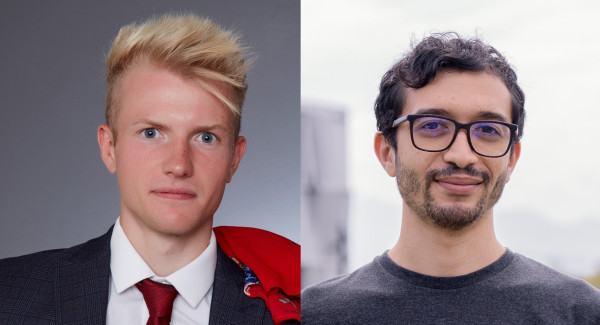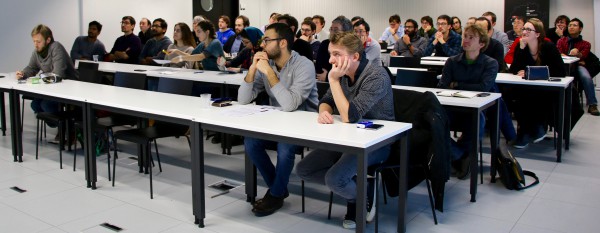MARVEL Junior Seminar — February 2023

Each seminar consists of two presentations of 25 minutes each, allowing to present on a scientific question in depth, followed by time for discussion. The discussion is facilitated and timed by the chair.
Onsite participation
11:45 — Pizzas will be served in the MED building atrium, second floor
12:15 — Seminars take place in EPFL room Coviz2 (MED 2 1124)
Online participation
Starting at 12:15:
https://epfl.zoom.us/j/68368776745
Password: 1923

Abstracts
Talk 1 — Enter the MaZe: a novel approach to first-principles molecular dynamics
Taylor James Baird1 , Alessandro Coretti1,2,3 , Rodolphe Vuilleumier4 , Sara Bonella1
1 Centre Européen de Calcul Atomique et Moléculaire (CECAM), EPFL
2 Faculty of Physics, University of Vienna, Austria
3 Dept. of Mathematical Sciences, Politecnico di Torino, Italy
2 PASTEUR, Dept. de chimie, École normale supérieure, PSL Universite, Sorbonne Université, France
Recently, a novel methodology - referred to as mass-zero constrained dynamics (MaZe) - has been applied to the problem of simulating atomistic systems via first-principles molecular dynamics (FPMD) based on orbital-free DFT. MaZe constitutes a promising approach to this problem, owing to its rigorous and efficient enforcement of adiabatic separation of the electronic and nuclear degrees of freedom (the electrons are strictly confined to their ground state) throughout the system’s time evolution by means of constrained MD. In this presentation I shall demonstrate the construction of the method and how it yields several desirable formal properties such as time-reversibility, symplecticity, and faithful sampling of the exact Born-Oppenheimer probability density of the nuclei. Following this, I shall briefly precise the algorithmic implementation of the approach, which couples Verlet integration alongside the SHAKE method to propagate the system forward in time whilst concurrently satisfying the adiabatic constraints. I shall then proceed to demonstrate the performance and accuracy of MaZe applied to a physically relevant test system. The talk will conclude with a summary of two ongoing avenues of work: firstly the extension of MaZe to incorporate nuclear quantum effects, and secondly the implementation of the method within the more traditional Kohn-Sham formulation of DFT.
Talk 2 — Learning the electronic density of states: electronic properties without quantum mechanics
Chiheb Ben Mahmoud, Federico Grasselli, Michele Ceriotti
Laboratory of Computational Science and Modeling (COSMO), EPFL
The electronic density of states (DOS) quantifies the distribution of the energy levels that can be occupied by electrons. It also underpins the computation and interpretation of experimentally observable material properties such as optical absorption and heat capacity. It can be accurately computed through expensive first-principle calculations, limiting the size of the problems that can be simulated easily to a few thousand atoms.
In this talk, we present a machine-learning (ML)-based model for the DOS. We discuss the inherent challenges in constructing an ML framework that predicts the DOS as a combination of local contributions that depend, in turn, on the geometric configuration of neighbours around each atom.
Moreover, we explore two approaches to leveraging the DOS in integrated ML frameworks to model the properties of materials by incorporating the effect of the electronic thermal excitations: (1) we perform band energy calculations on already-produced trajectories from well-established ML interatomic potentials to compute the electronic contributions to the heat capacity in metallic systems, and (2) we introduce a rigorous framework to calculate the finite-temperature electron free energy based exclusively on ground-state total energy and DOS while allowing to sample on-the-fly the electronic free energy at any temperature. This physically-motivated approach facilitates modelling material properties in extreme conditions with a fraction of the usual cost. We benchmark it on a challenging portion of the metallic liquid hydrogen phase diagram.
These methods demonstrate the impact of a universal model describing structural and electronic properties inexpensively and its ability to enable more accurate and predictive materials modelling and design.
References:
[1] Ben Mahmoud, C., Anelli, A., Csányi, G., Ceriotti, M., 2020, Phys. Rev. B 102, 235130.
[2] Lopanitsyna, N., Ben Mahmoud, C., Ceriotti, M., 2021, Phys. Rev. Materials 5, 043802
[3] Ben Mahmoud, C., Grasselli, F., Ceriotti, M., 2022, Phys. Rev. B 106, L121116
Check the list of the next MARVEL Junior Seminars here.
Low-volume newsletters, targeted to the scientific and industrial communities.
Subscribe to our newsletter